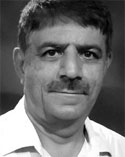Divine Connection
 By Amin Valliani
By Amin Valliani
January 15th, 2016
IN a tiny drop of water are found all the secrets of the ocean. A small bit of rice gives us the taste of the whole cauldron, and a few grains indicate the quality of a large sack of wheat.
Similarly, human beings — created from a single soul — are the vicegerents of Allah on earth, equipped with the highest potentialities. All divine attributes are realisable at the human level. For example, the Holy Prophet (PBUH) reportedly said: “Adorn yourself with the attributes of Allah.” But many of us are oblivious of this fact.
A teacher once asked his students which of them had seen God. Everybody was taken aback at the question; the whole class was silent looking at each other, and no response came forth. At last, a student raised his hand to answer the question. He said, “I have seen God.” Upon this, the teacher asked, where? He said, “Everywhere.” Allah says in the Holy Quran: “...And He is with you, wherever you may be. …” (57:4).
Nature and all living creatures need our compassion.
We are with God. He reveals Himself to discerning eyes and thoughtful minds. Numerous signs around us indicate His presence, such as the birth of a newborn, the evolution of the human foetus, the activities of human blood, the automatic working of internal organs like the heart, the ability to repair internal and external injuries etc. All these functions bear testimony to His greatness.
Our connection with the Divine can be compared to an electric light bulb connected with the main powerhouse. The bulb illuminates our homes every night because it is connected through concealed and unconcealed wires to the electric pole and then on to the main powerhouse. If the bulb has 100-watt capacity, it illuminates with more brightness while the low-wattage bulb illuminates dimly.
It consists of transparent or translucent glass containing a wire filament that emits light when connected. If the bulb’s glass is dusty, it affects the brightness while a clean bulb’s glass would have more brightness. A fused or broken bulb does not emit light; it fuses when an inner wire is broken or if there’s a tiny hole on its surface. The glittering shades and other decorative items placed around the bulb enhance its brightness. Similarly, the socket through which the bulb is connected, if loosened, also affects power supply to the blub.
This example can aptly be related to individual human beings whose body is made of flesh but is spiritually connected to Allah. If one realises the strength of this divine connection, one can illuminate the path for others. A person needs to be pure inside out so that he or she can strengthen the divine connection.
All religions persuade humanity to realise the divine origin of its existence and the inherent spiritual link with the Creator. For Allah says “...And We are nearer to him than his jugular vein” (50:16).
While narrating the story of Prophet Adam, the Holy Quran says that Allah made him His vicegerent (khalifa) on earth. This means mankind is the custodian of God’s other creations, charged with a responsibility to supervise and protect earthly resources. This includes minerals, plants and animals and other environmental factors which support life.
Thus, every human has a three-fold responsibility: ie keeping a close connection with God spiritually, with society and with the world’s physical environment. He is called upon to strengthen all these links by fulfilling the responsibilities towards God, his fellow beings and to take care of his material world for which he has been made trustee.
Throughout history, mystics and intellectuals have emphasised the realisation of this three-fold responsibility to the extent that they regard it as a core of faith. With realisation, a person not only understands his/her origin but performs astounding feats by unfolding his physical and spiritual capabilities.
He develops a sense of compassion towards other creatures. He makes himself/herself accountable in case of any mishaps. Besides, he develops sympathy, empathy and a soft corner towards society and shares his time, knowledge and other material resources to uplift society. He puts values into practice and raises his voice whenever the values are violated.
Presently, we are confronted with numerous challenges. For example, there is rampant pollution and environmental degradation all around us, while endangered animals are caught, smuggled or killed. Islam strictly condemns the hunting of defenceless creatures. In fact, Islam enjoins us to be kind towards all life forms on the planet.
We have been made the ‘crown of creation’; our role and responsibilities as humans encompass the safety and security of the entire world and its beauty. All living creatures and nature need our compassion. This message needs to be part of our school curriculum, and the media should remind us of it.
Amin Valliani Is An Educationist With An Interest In Religion.
Source: The Dawn, Karachi




 Moderate Islamist here
Moderate Islamist here


0 comments:
Post a Comment